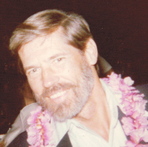A Eulogy for My Father
Kenneth Albert Pruett October 17, 1936 – October 3, 2001 Ken Pruett was a hero to many.
His younger sister Kay remembers him like this: “I guess you might say my memories of Ken are of a person who was simply larger than life, my own personal super hero.” Kathy Teurk, a former patient, says unequivocally, “Ken Pruett was my hero. Not in some generalized way; he was my personal hero. Heroes are people who save you from harm. He saved me from harm.” My sister Cindy remembers going on hospital rounds with our dad when she was young (we fought for the privilege of this super-special time with our father). She says, “I would generally get put at the nurses’ station and the nurses would tell me how wonderful Dr. Pruett was – as if I needed convincing! At that time, I knew with all my heart that he was the most wonderful man in the world, and that he loved me completely.” To this day, Cindy likes the smell of hospitals for the feeling of safety and comfort it evokes. For my part, my favorite memory of going on rounds with my dad was the nurse who – in telling me how lucky I was to have Dr. Pruett as my father – gushed, “And doesn’t he look just like Kris Kristofferson!” He brought to mind an earlier matinee idol when my mother Jane first laid eyes on him. “When I first saw Ken,” she remembers, “ he stuck out like the proverbial sore thumb.” (This was on her first day of classes at Harvard.) “Thousands of cookie-cutter boys in khaki pants, white button-down shirts, knitted ties, tweed jackets with suede elbow patches, all moving purposefully – and there was Ken, leaning up against a wall in a crew-neck white undershirt, faded blue jeans, and blue suede shoes.” So yes, as my aunt Kay observed, Ken Pruett was larger than life for those who admired him. His intelligence, athleticism, and appetites all assumed the status of legend. His older sister Pat says, “Ken is probably the smartest person I have ever known. The way he worked crossword puzzles, straight across the lines, in ink, was astounding to me.” His intelligence is mentioned, without fail, by every one who remembers him – along with those crossword puzzles, which he timed himself against. His mind is described as a steel trap. Friends who comment on the vast amount of knowledge he possessed only regret that his did not live to appear on Jeopardy. (He’d been auditioning when he got sick.) Amy and Richard Ivester say, “He would have been a certain winner.” Ken was also renowned for his physical strengths and appetites. A high school wrestler, track and field and football player, he ran the Honolulu Marathon later in life. While he was a model of physical fitness, he admitted as an adult that his primary motivation for exercise was to be able to eat more. Oh, and how he loved to eat! Many of his friends’ favorite memories center around “great meals and quite a few wonderful bottles of wine,” as Manuel Peña puts it. One of my father’s signatures moves was the big show he’d make out of wringing every last drop from a bottle as if it were a dishrag. And his most famous saying was, "There’s always room for ice cream. It just melts and fills in the cracks!” Not that there were too many cracks left when Ken pulled another of his classic acts – ordering every dessert on the menu for the table. Why choose? Ken’s larger-than-life qualities were matched by the way he appeared to have pole-vaulted from his humble origins into the Ivy League. Although neither of his parents had attended college, “Even as a little boy,” his sister Pat recalls, “Ken was always focused on his desire to be a doctor. He never went through the ‘I wanna be a fireman’ or ‘I wanna be a cowboy’ phase like the other little boys. He just wanted to be a doctor.” |
He caught the attention of a prominent prep school alumnus who recruited him to leave his home in Charlotte, North Carolina at the age of 13 to go to Andover on full scholarship alongside the heirs of America’s oldest money. The first car his parents owned was a used one they bought to drive north to see him graduate. Skip Elsis, a former prep school and college classmate, remembers Ken as “noble, honest, loyal, humorous, sincere, loving, curious, supportive, intelligent, a leader and a role model.” But for all these heroic traits, like many heroes, Ken Pruett was truly known by very few. He may have walked through the world as Prince Charming, but inside – one wonders – did he still feel himself the frog, fearing the spell that had transported him from the working class of the Deep South to Andover, Harvard, and the life of a world-travelling surgeon – might that spell wear off at any moment? Ken didn’t say. While his words impressed others, he didn’t speak much, and certainly not of the inner dragons he must have had to slay to leave behind his childhood family and later the family he’d created with me, my sister, and our mother. When he moved from Connecticut to Hawaii with Sue, the woman he would love and be loved by for over 30 years, he planned never to come back to the pedestrian life of raking leaves and shoveling snow. But it turned out that the good life in Hawaii – and it was a good life – was not enough. When he reached 55, the minimum age of retirement, he quit medicine. He and Sue left their 29th floor condominium in Waikiki for a large home off a gravel road in a cul de sac development on the western side of Puget Sound. He once again took up yard chores. He dabbled a bit in woodworking and expert witness work for medical malpractice suits (everyone knew he would have been as great a lawyer as he was a doctor) – but mainly he spent his time hanging out with his beloved Sue, enjoying her excellent cooking; walking, hiking and cross-country skiing together; going into Seattle for opera and theater. There was still plenty of time for crossword puzzles, jigsaw puzzles, preparing to audition for Jeopardy, and the cats – showering love on their house full of cats. Ken had always doted on the cats that he and Sue considered their children, but in Port Orchard he had hours to spend sharing his cereal bowl with them, administering any medications, brushing their coats and their teeth. When he was struck by brain cancer at the age of 63, he’d had seven years of living exactly as he’d wanted. Manuel vividly remembers Ken saying years ago, “I want to retire at an early age to enjoy life and do the things I like to do because I’ve seen too many people close to me work until they’re just too old to do what they enjoy.” “Yes,” Manuel says, “we all wished it would be longer, but sometimes people live more in a few years than others do in a lifetime.” When he died two weeks short of his 65th birthday, ten years ago now, Sue lost her rock. My sister Cindy lost her chance to make peace with the mortal man inside the Prince Charming who’d strode off into the sunset, never to return, so long ago. And I lost the friend I’d made through his eighteen months of sickness when we’d spent time together every week, laying to rest, in some unspoken way, the dragons of the past, and becoming family with each other once again. After my father’s death, Sue and I and my partner Amber went back to Theler Wetlands, a wildlife sanctuary Ken and Sue had visited many times. As we each remembered my father in our own way, we looked up to see a bald eagle joining us. It hovered aloft above us for what seemed a very long time, following us as we strolled the boardwalks. This mythic creature, imbued with legendary powers by cultures the world over, was hunted near to extinction because people failed to see it as real and vulnerable. My father’s journey ended with him very real, very vulnerable. And I believe it was in that place that he fully knew how truly loved he had been. * * * Read my blog posts about memoralizing my father's loss. |

